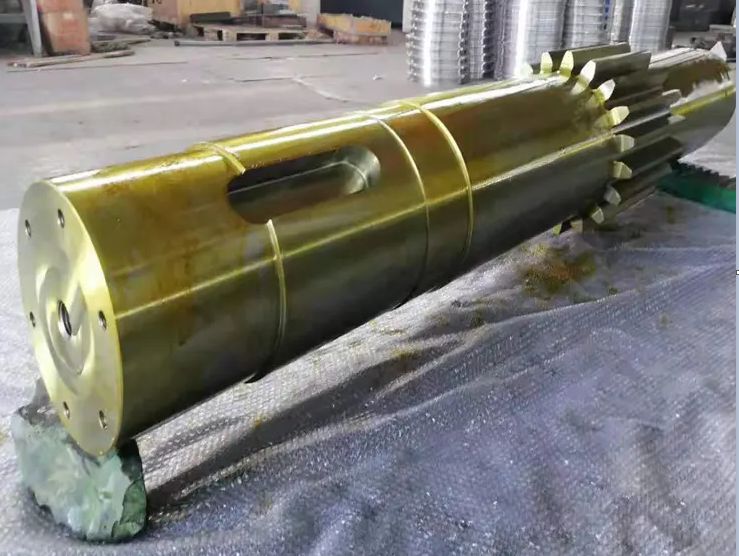This type of shaft has good machining performance. In practical applications, it does not have any porosity or other defects, so it not only has good appearance assurance, but also has excellent performance.
There are many types of gear shaft forgings. Commonly used gear forging materials include 40Cr, 42CrMo, 20CrMnMo, and 20CrMnTi. 42CrMo and 40Cr forged gears are mostly large gear forgings in the lifting industry, while 20CrMn molybdenum and 20CrMnTi are mostly used for forging gears in transmission machinery. Most gears require lifting gears. In 38-42HRC, the heat treatment hardness of the gears achieved good performance. Due to the excellent heat treatment hardenability of the former, the toughness of 42CrMo is much better than that of 40Cr, which is closely related to its material. Similarly, at the same hardness, the strength is very close. The tensile strength of 40Cr is 6~; The tensile strength of 42CrMo is 110kg/mm2, and the yield strength is 95kg/mm2. The performance is much better than 40Cr.
40Cr material has good hardenability.
Water quenching can harden to a diameter of 28-60 millimeters, while oil quenching can harden to a diameter of 15-40 millimeters. After quenching and tempering, the material exhibits excellent comprehensive mechanical properties, low notch sensitivity, and low-temperature impact toughness. 40Cr gear forgings are usually subjected to surface high-frequency quenching or nitriding treatment after quenching and tempering. When the hardness is 174-229HBS, it has good machinability, with a relative machinability of 60%. The carbon content of 40Cr material forgings is maintained at around 0.40%, thus ensuring a good combination of strength and toughness of the steel. Add Cr element. (Cr, Fe) 3C. The initial forging temperature of 40Cr gear forgings is 1100~1150 ℃, and the forging temperature is 800 ℃. After forging, dimensions exceeding 60 millimeters require slow cooling.
Gear shaft manufacturer reminds that the material of gear shaft forgings must first meet the requirements of working conditions. When selecting gear forging materials, the first thing to consider is the requirements of working conditions. Alloy steel is commonly used for manufacturing gear forgings that work under high-speed, heavy-duty, and impact loads. High reliability is required, and it is essential to choose alloy steel with high mechanical properties. If the gear size is required to be as small as possible, high-strength alloy steel with surface hardening treatment should be used. The gear transmission in mining machinery usually has high power, low working speed, and high dust content in the surrounding environment. Therefore, materials such as cast steel or cast iron are often chosen, but the noise transmission is relatively small, and the working frequency of office machinery is relatively low. This type of shaft has good machining performance. In practical applications, it does not have any porosity or other defects, so it not only has good appearance assurance, but also has excellent performance.
Contact us today to learn more about how we can support your operations and help you achieve your production goals, mail Sophie Song sales10@welongmachinery.com
Post time: Sep-13-2023





